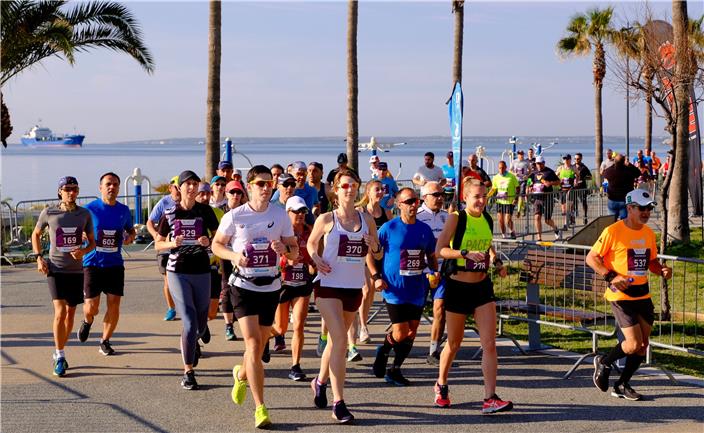Running in the heat

With the weekend fast approaching and a heat alert from the Met Office showing UK temperatures over 30 degrees, please be careful running in the heat this weekend. Here we offer some top tips and advice to help you keep cool in the mid-summer heat-wave.
You should definitely pick your time of day and avoid the midday sun. Early morning and late evenings are a far more sensible time to go out. The mornings can be particularly pleasant as the air feels clean and fresh and you have peace and quiet before the rest of the world awakens!
Think about the other weather factors. Is there a breeze? If so choose a route where the wind is behind you on the way out when you are still cool and fresh and then you will have it against you to cool you down in the latter parts of your run.
You would also be wise to choose a route with plenty of shade. Are you able to run through woodlands? Even better, does your route take you anywhere that you can go for a dip? Running on the beach might be a good option where you can cool your legs down or even submerge completely afterwards.
Sunscreen is a must when running in hot weather. When you're wearing shorts and singlet you are sure to get burnt if you neglect to slip, slop, slap ample sun lotions.
Light-coloured clothes help reflect the heat and moisture wicking and light fabrics will make for a more comfortable run. Avoid cotton. It will become wet and it prevents evaporation of your sweat, which is how your body cools itself, and it can cause chaffing, especially if ill fitting.
Wearing a cap is good as it protects your face from the sun but make sure this is made from breathable material. Lightweight socks are also good. Hot feet are no fun and can lead to your feet swelling and then your shoes feeling tight and black toe nails!
Don't forget to hydrate before you go and if you are going out for a while you should either know where you can get some or take some with you. If it is very hot you would be wise to sip some water every 20 minutes or as you feel you require it. You should continue to sip water when you have finished your run too but avoid glugging down quantities in excess of 300ml or a glass of water. Normally you can only absorb around 220ml within 20 minutes.
Level 4 endurance coach and Manchester Marathon winner, Bashir Hussain won the Hong Kong Marathon in 90% + humidly with temperatures in the 30’s, so knows how to survive extreme heat. While having a best half marathon time of 63 minutes he decided to be sure he was slower than 70 minutes for the first half of the race. This paid dividend as 2-11 runners finished behind him with many dropping out after starting too fast. He offers the following tips:
· On hot days wear clothing that keeps you cool. This is usually something white and light as this reflects the sun rays and also evaporates any damp patches quickly to limit the chances of chafing or blisters.
· Wear socks that will help evaporate sweat quicker and are made for sport, not a random pair from the store or marketplace but from a trusted sports outlet.
· Using an experienced pacemaker as shown in the picture above, is a massive help with efficient even paced running that will limit your chances of starting too fast. A good pacemaker will also inspire you with good advice and local knowledge of the course.
If it is very hot, slow the pace down and you could even put in some walking breaks. You should not try to run as fast as you might on a cooler day. If you are racing on a very hot day you could cool your neck down before you start the race and maybe keep a very cold bandana around your neck for the run as this may help performance but you should realise why this works and be aware of the dangers.
Research at Roehampton University in London found that healthy young men could cover significantly more distance during a timed run on treadmills in a hot laboratory if they supplemented their workout gear with an ice-cold strap-on neck collar. The collar, lined with flexible artificial-ice packs, noticeably lowered the skin temperature on the men’s necks. However, they did not lower their body temperatures over all. In the experiment, the men could run further with the neck collars but when their legs did give out their core temperatures were significantly higher. An elevated core body temperature can be dangerous and it seems that our bodies tell our brains to stop running when this is the case. In this experiment the runner's bodies were growing warmer but their brains were not registering it. It seems their running time was extended “by dampening the perceived levels of thermal strain.”
Finally, keep a check on your heart rate and if it is higher than is normal for you then slow down or maybe take a rest day!
More tips and advice below:
Running in the sun
Get ready for summer
Running in extreme weather
